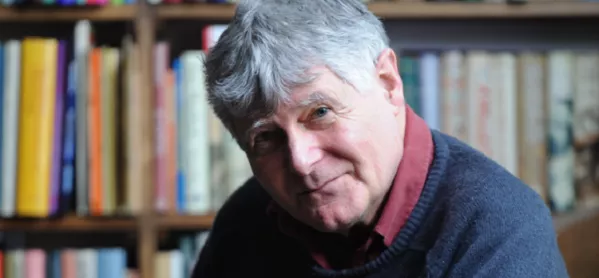Sir Chris Woodhead 1946-2015

Sir Chris Woodhead, who had motor neurone disease, was the first schools inspector to become a household name.
As Ofsted’s chief inspector of schools from 1994 to 2000, he was best-known for his fierce opposition to “progressive” educational theories - which he had supported earlier in his career - and his belief in “traditional” teaching methods.
An outspoken and controversial figure in the educational world, Sir Chris clashed frequently with teachers, unions and politicians.
Much of his criticism focused on poor teaching. He once claimed there were “15,000 incompetent teachers” and said he was “paid to challenge mediocrity, failure and complacency”.
His supporters saw him as a radical reformer tackling an over-defensive profession but critics argued that he was out of touch with classroom realities, rarely praised good teachers and damaged morale.
Christopher Anthony Woodhead was born in Cockfosters, London on 20 October 1946, the only child of an accountant and a school secretary. A graduate of Bristol university, where he also did a PGCE, his career in education began as an English teacher at his old school, Wallington County Grammar School for Boys in Surrey.
He moved on to the Priory School in Shrewsbury from 1969-72 but, drawn by the rise of the comprehensive movement, he took a job as assistant head of English at Newent Community School in Gloucestershire. After that he spent two years, from 1974-6, as head of English at Gordano comprehensive near Bristol.
As a child of the 1960s, Sir Chris said he believed in “utopian, egalitarian solutions” but began to have doubts about mixed-ability teaching when he struggled to instil interest in Shakespeare among pupils who had trouble reading. His conversion was completed when he moved into teacher training and visited his trainees on their placements, he said.
Sir Chris was ambitious and rose through the ranks of local authorities and government quangos before taking the job of chief inspector for the Office for Standards in Education (Ofsted), in 1994.
For his first three years as chief inspector, he battled with the unions but for most of his term he fought a war on two fronts: against those in the profession who disagreed with him, and with a government he was increasingly at odds with.
He said that Tony Blair, the prime minister, shared his concern for standards, but he trusted David Blunkett, the education secretary, much less. In his 2009 book, A Desolation of Learning, Sir Chris described his role as being like “a lightning rod for political controversy”, and he was happy to draw fire from Blair and Blunkett to smooth the way for changes to the school system.
His high profile prompted one critic to declare that Sir Chris was the first of Her Majesty’s Inspectors “to attain the doubtful reward of national celebrity”.
After resigning as chief schools inspector in 2000 he became a champion for education traditionalists. In his 2002 book, Class War: The State of British Education, he delivered a damning verdict on its failures. Soon afterwards he was appointed a professor of education at the independent University of Buckingham.
His inspection framework was abandoned shortly after he stood down and, in a 2011 interview with the TES, he said he was gloomy about the current state of education.
“If there was more honesty about poor performance then people would take teachers more seriously,” he said. The teaching unions were “not prepared to acknowledge that anything is wrong” and education policy had been captured by an “unrepresentative minority”.
Sir Chris was diagnosed with motor neurone disease in 2006 but he remained a provocative commentator and wrote regular columns for national newspapers. He hated educational jargon and was scathing about academic research which he felt had little influence. Pundits, professors, trainers and local authority advisers, were also targets of his wrath, promoting “all the things that I abhor”.
Sir Chris supported Michael Gove, the former education secretary’s commitment to “the knowledge curriculum”, to facts and dates over abstract skills, and for introducing competition through free schools. But he said Mr Gove was “bonkers” for suggesting that everybody could, or should, go to university and the English Baccalaureate was a mistake because it would play down vocational subjects.
In 2004, he founded Cognita which runs 64 schools in the UK and abroad. He faced some criticism from some parents at the Southbank International School in London, for the school’s profit-making ethos.
Cognita ploughed more money into the school and Sir Chris said the episode showed the strength of for-profit education: businesses have to listen to their customers. He said all independents should give up charitable status and “tell the government to get lost and concentrate on the education of their children”.
In the 2011 TES interview, he cheerfully wrote off his career as a failure. “I think I’ve been totally defeated on the evidence of what I read in the Times Educational Supplement,” he said. But he added, with a laugh: “I did my best. I’m not brooding about failure. If people haven’t picked up the baton, then so be it - they will realise their mistake in due course.”
Sir Chris was knighted for for services to education in the 2011 Birthday Honours.
In 2009, he said he would prefer to end his own life than suffer the indignities of the final stages of the disease. He was a patron of Dignity in Dying and campaigned for an assisted dying law. A keen runner and rock-climber, Sir Chris told TES his main regret was “I spent too much time on education. If I were living my life again, seriously, I would spend much more time in the mountains.”
Sir Chris, who lived in Herefordshire, leaves his wife, a daughter and two granddaughters.
Keep reading for just £1 per month
You've reached your limit of free articles this month. Subscribe for £1 per month for three months and get:
- Unlimited access to all Tes magazine content
- Exclusive subscriber-only stories
- Award-winning email newsletters



